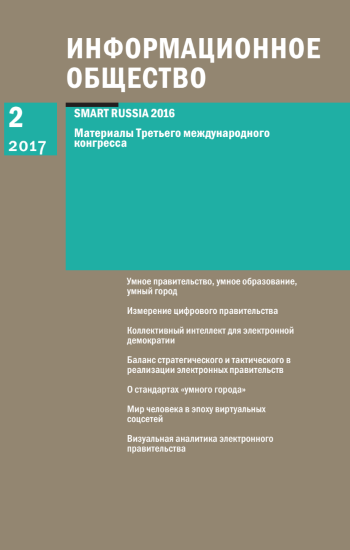|
 In the rubric “Leaders of the Information Society” an exclusive interview of Andrea Di
Mayo, Managing Vice President of Gartner Research, given to the “Information
Society” journal is published. In the interview the differences between the
electronic and digital government, assessment of the role of open data in the
digital economy is discussed and the growing problem of data security is
highlighted. The fact that the digital government is an integral part of the
digital economy is emphasized. In the rubric “Leaders of the Information Society” an exclusive interview of Andrea Di
Mayo, Managing Vice President of Gartner Research, given to the “Information
Society” journal is published. In the interview the differences between the
electronic and digital government, assessment of the role of open data in the
digital economy is discussed and the growing problem of data security is
highlighted. The fact that the digital government is an integral part of the
digital economy is emphasized.
Under the heading “Social and Economic Aspects of the Information Society”
the article by Evgenii Zinder "Managing
strategic and tactical balance in the implementation of digital enterprises and
e-government", in which development of e-government, digital
transformation of enterprises and economic systems are discussed.
Further Leonid Goloskokov in
the article “Network structures within the framework of national consolidation
doctrine: risks and economic aspects of security” describes the possibility of
creating network structures being one of the important technical elements of
the national consolidation doctrine. Methods of building networks are
suggested, some risks are assessed, and some security issues are analyzed.
The article by Larissa Mararitsa
and Sergei Titov presented in the rubric “The Man in the Information Society” and
entitled “Social World of Man in the Age of Virtual Social Networks”. It sets
the objective of reviewing and stydying virtual communication phenomena with
the purpose of analyzing its impact on the structure and quality of personal
contacts, opportunities that social networks open up to the person.
Further Boris Slavin and Vladislav Protasov discussed the
possibility of applying advanced collective intelligence technologies for the
improvement of e-democracy in their article. Collective intelligence
technologies are an alternative to crowd sourcing technologies and involve the
use of self-developing communities of people to organize group intellectual
activity.
Under the heading “Science and Innovations in the Information Society” the
article by Dmitrii Namiot “On Smart
City Standards”, in which standards related to information and communication
technologies, is published. The article is an expanded
and supplemented report presented at the International Congress “SMART RUSSIA
2016”. Further, Igor Mikhailov introduces
us to the hyper-network theory in his article “Hyper-network theory and
interdisciplinary integration of cognitive and social sciences”.
And finally, the article by Alexander
Raikov entitled "Visual Analyzes of E-Government
for Strategic and Spatial Planning" is presented in
the rubric "Information Society
Technologies". It describes intellectual technologies and visualization
tools, which are given great importance and allow one to present the problem
situation in a single-minded and holistic manner. |

